THE RETURN OF JOHN GUARE, WITH MIXED RESULTS
High expectations lead inevitably to disappointment while low expectations often lead to pleasant surprises. Having read Ben Brantley’s drubbing of A Free Man Of Color, John Guare’s historical comedy of the Louisiana Purchase, I expected to be bored to distraction by an unfocused gumbo of a play. A Free Man Of Color could, indeed, stand some tightening, but it IS entertaining. And while its treatment of the issues of race and slavery is far from profound, the show is powerful in how it emphasizes the fact that, compared to imperial Spain, the democratic United States was less liberal in its treatment of the children of slaves and whites.
Much of Free Man’s entertainment value comes from the fact that the costumes Ann Hould-Ward has designed under George C. Wolfe’s direction are both funny and a feast for the eyes. The clothes that Jeffrey Wright’s title character Jacques Cornet wears are a fop’s wardrobe souped-up by Liberace. Peter Bartlett’s emasculate French planter and Veanne Cox as his sexually frustrated, pioneering scientist of a wife are walking sight gags. Many of the plays characters are burlesques of historical figures such as Thomas Jefferson, Napoleon, Toussaint Louverture, and the King and Infanta of Spain, and their outfits seem to have been taken from Bugs Bunny cartoons.
Indeed, the whole play is a burlesque and falls short of Guare’s ambition to create a Restoration-style comedy. Wright’s free man is based on Horner from William Wycherly’s The Country Wife (Cornet means “cone” in French, the root of which is the French word for “horn.”) Pincepousse, the name of Cornet’s cuckolded half-brother (Reg Rogers), is partially a French version of the name of Wycherly’s cuckold Pinchwife, and many of the other cuckolds in the play take their names from The Country Wife’s dramatis personae. Yet, Guare’s slapstick is far cruder than Wycherly’s bawdy wordplay. Also, Guare’s and Wolfe’s sexual humor is even less subtle than Wycherly’s – Napoleon (Triney Sandoval) rises from his bath to reveal a canon where his genitals should be.
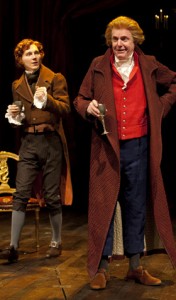 Guare makes a stab at creating a variation on the plot of The Country Wife as well as that of Ben Johnson’s Jacobean comedy Volpone. Cornet, hearing that Spain has ceded Louisiana back to its previous colonial master France, fears that Napoleon will restore Louis XIV’s code noir, which would rob Cornet of his white father’s estate. When he seeks help in preventing the restoration of the code from the French, Spanish, American, and British envoys to Louisiana, he is rebuffed because they want him nowhere near their wives (whom he has already seduced). He puts out the word that, having been shot in the groin in a duel, he has been rendered impotent and moribund. à la Wycherly, the bogus emasculation gains him access to the wives and, á la Johnson, the rumors of his death and will gain him the obsequious friendship of the husbands. However, Guare quickly abandons this plot and returns to his historical skits. This abrupt dropping of the story may have to do with the fact that Guare’s epic-length play has been halved for this production.
Guare makes a stab at creating a variation on the plot of The Country Wife as well as that of Ben Johnson’s Jacobean comedy Volpone. Cornet, hearing that Spain has ceded Louisiana back to its previous colonial master France, fears that Napoleon will restore Louis XIV’s code noir, which would rob Cornet of his white father’s estate. When he seeks help in preventing the restoration of the code from the French, Spanish, American, and British envoys to Louisiana, he is rebuffed because they want him nowhere near their wives (whom he has already seduced). He puts out the word that, having been shot in the groin in a duel, he has been rendered impotent and moribund. à la Wycherly, the bogus emasculation gains him access to the wives and, á la Johnson, the rumors of his death and will gain him the obsequious friendship of the husbands. However, Guare quickly abandons this plot and returns to his historical skits. This abrupt dropping of the story may have to do with the fact that Guare’s epic-length play has been halved for this production.
At the end of the play, Guare attempts to underline the irony that America under the Presidency of the author of the Declaration of Independence (John McMartin plays Thomas Jefferson) is less racially tolerant than an autocratic monarchy. The denouement could have been chilling, but Guare overloads it with everything from suicide of Merriwether Lewis (Paul Dano) to a prediction of Hurricane Katrina.
The cast is a game and energetic bunch. Wright and Mos (formerly Mos Def) are strong as the leads. Veanne Cox gives a standout comic performance as the sex-starved French scientist. But A Free Man Of Color, though an entertaining spectacle, doesn’t live up to its author’s ambitions. Don’t pay full price; but if you can get an inexpensive ticket, give it a shot.
photos by T. Charles Erickson
A Free Man Of Color
The Beaumont at Lincoln Center Theater
ends on January 9, 2010
for tickets, visit LCT
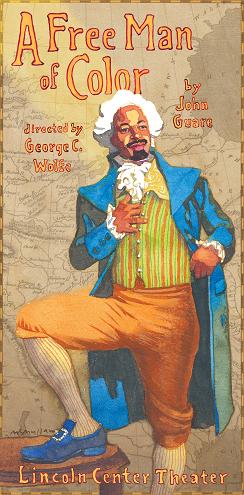
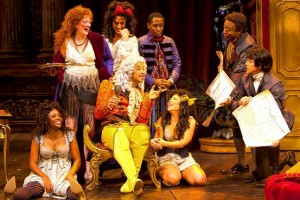
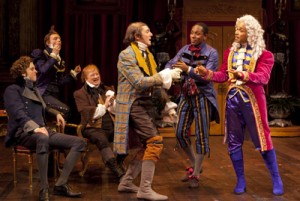
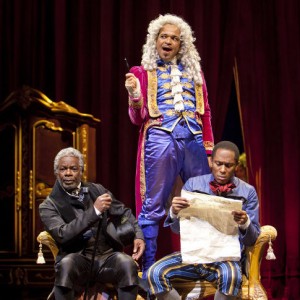
{ 2 comments… read them below or add one }
I thought the first act was sprawling and confusing – too many characters, too much history, too many locations. I wasn’t offended by the bawdy humor but I didn’t find it all that funny. And I’m not enough of a theatre scholar to know that it was supposed to be a homage to other works.
But near the end, I thought the play really came together in a way that I found powerful. It shows how tenuous life was for a black man, even a supposedly free man of color. It’s about how our ideals as a nation are often in conflict with our actions. And I’ll remember the very last line for a long time.
It’s not a play I’d recommend to everyone but if you’re interested in New Orleans or that time period in history or race in America or just an ambitious new American play, I would check it out. But like you said, try to find a discount ticket!
OMG! I love the play so much. I think that is was a good idea to show a play like this one. It helps African-Americans to know more about their history, and where the real story came from.
KEEP UP THE GOOD WORK!!!!